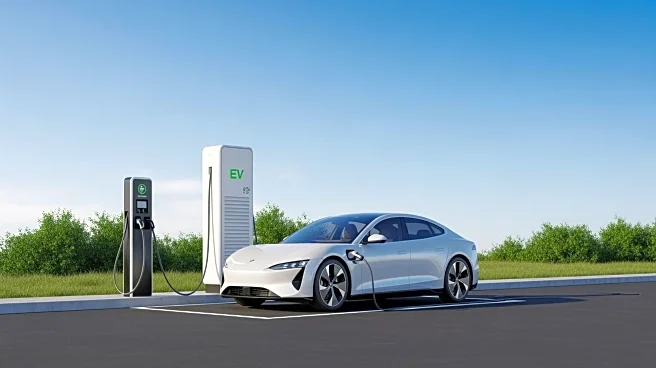What's Happening?
Kenya's electric vehicle sector is experiencing significant growth, particularly in the electric motorcycle segment, which saw its market share rise to 7.1% in 2024. Despite this progress, electric car
adoption remains low, presenting a substantial opportunity for investors. The Electric Mobility Association of Kenya reports that only 300 electric cars are currently in the country, compared to higher numbers in neighboring countries like Ethiopia and Ghana. The sector's growth is supported by factors such as the availability of used electric cars from international markets, affordable new models from China, and improving charging infrastructure. Investors are encouraged to explore opportunities in charge point operations and electric car leasing platforms, which are gaining traction and generating revenue.
Why It's Important?
The expansion of Kenya's electric vehicle market is crucial for reducing the country's reliance on fossil fuels, which currently costs nearly $500 million per month. Accelerating electric car adoption could alleviate the issue of low overnight electricity demand, allowing for better utilization of renewable energy sources. The growth of the electric vehicle sector also aligns with global trends towards sustainable transportation, offering economic and environmental benefits. For investors, the nascent stage of the electric car market in Kenya presents a chance to capitalize on early growth opportunities and contribute to the country's transition to cleaner energy.
What's Next?
As the electric vehicle market in Kenya continues to develop, investors may focus on expanding charging networks and supporting leasing platforms to facilitate wider adoption. The increasing availability of electric cars from international markets and the establishment of official dealerships will likely drive consumer interest and market growth. Government policies and incentives could further encourage investment in the sector, promoting sustainable transportation and reducing carbon emissions. Stakeholders may also explore partnerships with international companies to enhance technology transfer and infrastructure development.
Beyond the Headlines
The growth of Kenya's electric vehicle market reflects broader trends in Africa towards sustainable development and innovation. The transition to electric mobility could have cultural implications, influencing consumer behavior and perceptions of technology. Ethical considerations include ensuring equitable access to electric vehicles and addressing potential environmental impacts of increased electricity demand. Long-term success will depend on balancing economic growth with environmental sustainability and social equity.










